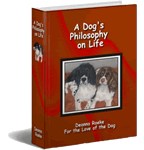|
Gastric
Dilatation Volvulus or 'Bloat'
It's one of the most perplexing health problems in dogs and one of the most dreaded by dog owners. It can strike at
any time without warning. Often described as "the silent killer," the complex disorder Gastric Dilatation Volvulus
(GDV), also called bloat, is a life-threatening emergency.
Being aware of this potential killer begins by understanding just why GDV is dangerous and deadly. It is
characterized by expansion of the stomach with gas or frothy material (dilatation). The stomach does not empty
normally. It is difficult for food to advance into the intestines, nor will food pass in the other direction as
vomit.
Dilatation can be followed by rotation of the stomach (Volvulos or torsion) which effectively closes the entry to
and exit from the stomach. Relief from this distended state is not possible. This rotation compresses one of the
major veins carrying blood to the heart, severely depressing normal blood circulation. Without immediate veterinary
treatment this condition can rapidly lead to shock and death.
Studies show that increasing age is a significant risk factor. Dogs older than 7 years were at least twice as
likely to have GDV than dogs 2 to 4 years of age. Genetic predisposition may also be a factor. GDV is seen
primarily in large dogs with deep chests.
It is widely accepted that diet does not cause GDV. Studies indicate that dogs with GDV had behavior patterns that
showed them ingesting large amount of air as they gulped water or ate. These studies suggest that how a dog is fed
may reduce the risk of GDV and the following precautions may be helpful:
- Feeding should not be preceded or followed by exercise.
- Dogs who habitually gulp their food may benefit by mixing dry food with water. This
increases the volume and helps to slow their eating.
- In a multi-pet household, feed dogs individually in a quiet place to slow their eating.
This may help calm dogs who gulp their food or feel they have to protect it while eating.
- Feeding two or more small meals a day is recommended.
- Dogs should not be allowed to drink water immediately after exercise or undue
excitement.
- Make any change in a dog's diet gradually over a 7 to 10 day period.
- Feed only a high quality dog food. Avoid feeding table scraps. Prevent access to other
sources of food such as garbage cans.
Although no measures are guaranteed to prevent GDV, scientific studies suggest the following strategies may help
reduce the risk:
- Try to avoid situations stressful to your dog such as loud rock music or the excitement
of large gatherings.
- If possible, avoid or minimize disrupting your dog's regular routine
- If you board your dog, kennel personnel should be instructed as to the diet to feed, how
much and how to feed. The importance of not changing your dog's diet or feeding routine should be
emphasized.
GDV can strike anytime. Early warning signs include:
- A sudden display of discomfort. An stricken dog may whine, pace, sit and get up again in
an unsuccessful effort to be comfortable.
- Frequent attempts to vomit are nonproductive.
- The abdominal area behind the rib cage appears bloated.
- The abdominal pain and distention become more apparent.
- The dog may not be able to get up.
- Signs of shock become evident: pale gums, rapid heartbeat and irregular shallow
breathing.
GDV is life-threatening and emergency treatment must be obtained immediately. Do not wait
for signs to progress before seeking veterinary care.
A final thought
Keep information concerning emergency contacts for your dog and other household pets near your telephone and in
your billfold. This information should include the telephone number and address of your veterinarian, the closest
pet emergency clinic that has night and weekend hours. If you have to rush your pet to your veterinarian, telephone
first to be certain he or she will be in the clinic to receive your pet.
| 





